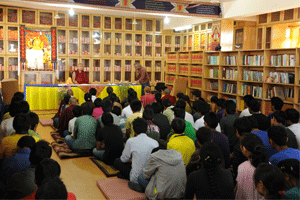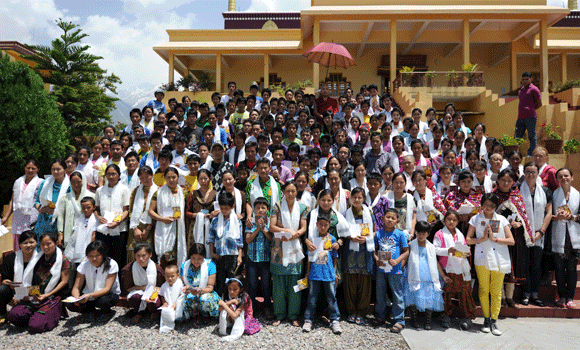21 May,2012 – Dharamsala
 The Gyalwang Karmapa held a special audience with more than 200 students, staff and Western volunteers, from the nearby Spiti Hostel, a boarding facility providing accommodation for young men and women from the Himalayan regions of Lahaul-Spiti in Himachal Pradesh and Zanskar in Jammu-Kashmir. In the main, the young people are post-16 years old students in local schools and colleges.
The Gyalwang Karmapa held a special audience with more than 200 students, staff and Western volunteers, from the nearby Spiti Hostel, a boarding facility providing accommodation for young men and women from the Himalayan regions of Lahaul-Spiti in Himachal Pradesh and Zanskar in Jammu-Kashmir. In the main, the young people are post-16 years old students in local schools and colleges.
After welcoming them all warmly, the Gyalwang Karmapa spoke of the profound bond of religion, culture and even customs, which links people across the Himalaya.
First of all, he reminded the students that they had the opportunity not only to pursue their own goals and ambitions through higher education but also to make an impact on their own communities as well as society at large. Thus, he warned, they needed to reflect carefully on their motivation at each step of the way, because their motivation would influence both their direction and the kind of impact they would make.
Secondly, he talked about their relationship with the world as a whole and all living beings. From the Buddhist point of view, he said, this world in which we exist, as we perceive and experience it, is the result of the collective karma of all sentient beings who live in it. Human beings possess a unique intelligence and discernment but are not justified in arrogantly controlling all other forms of life or dictating what course the world should take. On the contrary, the Buddhadharma teaches us to adopt an attitude of service rather than dominance. It is only when we wish to serve that we will truly appreciate our human potential and the special contribution we can make to the world.
Thirdly, Gyalwang Karmapa focused on how the students should bring the fundamental truths of Buddhism to bear on their daily lives. This is extremely important, commented His Holiness, because the basis of suffering is our lack of understanding of how things really are. Rather than being unrelated to our everyday lives, a subject for scholarly, philosophical discourse or difficult for ordinary people to understand, Buddhist teachings are a matter of common sense, supported by things we can observe very easily day-to-day. For example, if we examine the teaching on interdependence we will see that it is self-evident in our daily life. Similarly, the truth of impermanence is not a philosophical concept that we have to establish through argument; it is what occurs daily in our life. Or with regard to our precious human existence: that we need to cherish it and put it to good use is self-evident, and true whether you are religious or not. Thus, it is important to realise that the Buddhadharma is pervasive and has practical and immediate relevance in our ordinary, everyday lives.
Gyalwang Karmapa concluded his talk with some comments on the current environmental crisis. These days we can no longer defend actions, which damage the environment by claiming that we didn’t know, he said. Indeed, nowadays it’s more a case of information overload. The problem is that people do not act on the information; they somehow feel that it does not concern them. This is what needs to be addressed.
Following the talk, the staff and students offered khatas to His Holiness, and then gathered on the temple steps for a group photo.



